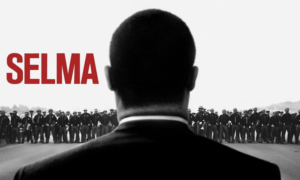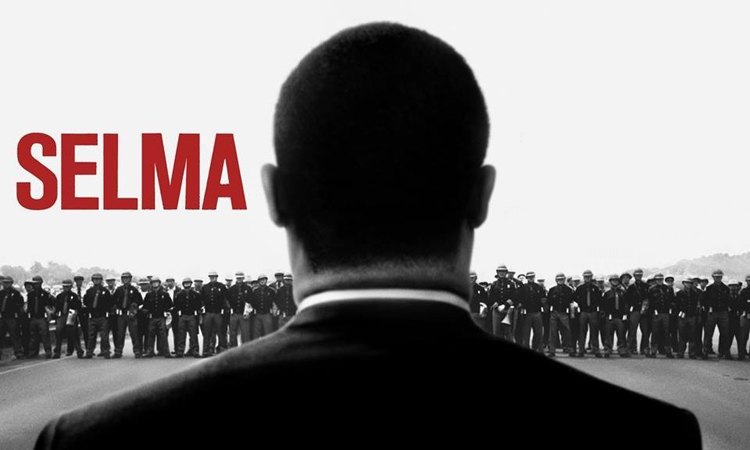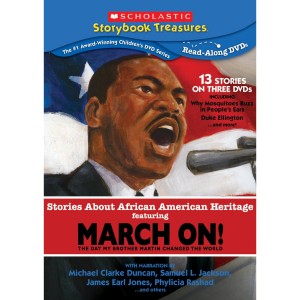Selma
Posted on December 24, 2014 at 5:55 pm
A+| Lowest Recommended Age: | Preschool |
| MPAA Rating: | Rated PG-13 for disturbing thematic material including violence, a suggestive moment, and brief strong language |
| Profanity: | Some strong and racist language |
| Alcohol/ Drugs: | Some drinking and smoking |
| Violence/ Scariness: | Very brutal violence including abuse and beatings by law enforcement and individuals, characters injured and killed |
| Diversity Issues: | A theme of the movie |
| Date Released to Theaters: | December 25, 2014 |
| Date Released to DVD: | May 4, 2015 |
| Amazon.com ASIN: | B00S1MYWBW |

“Selma,” director Ava DuVernay’s film about Dr. Martin Luther King, Jr. and the march from Selma, Alabama to the state capital at Montgomery, to make the case for the right to vote, is superb as biography, as history, and as drama. It is one of the best movies of this year and this decade.
And somehow it has arrived just as we need it most, as Americans continue to struggle to reconcile our notions of equality. This film is a powerful reminder of the Civil Rights Movement cry that “we’re not where we want to be, we’re not where we’re going to be, but, thank God, we’re not where we were.” It is a reminder of the difference one person can make, and the inescapability of an idea whose time has come. And it should also be a powerful reminder that the voting rights people fought — and died — must be exercised to carry that dream forward.
This is a story of politics and race and history, but it is also very much the story of a man who just wanted to be “a pastor in a small college town” but found himself called to lead a movement, even though he put himself, his followers, and his family at risk. King has to try to keep his supporters together, increasingly difficult as the very progress he has made has made them impatient and independent.
British actor David Oyelowo makes Dr. King into a real person, polite and respectful but also canny and insistent in his meetings with President Lyndon Johnson (Tom Wilkinson) in the Oval Office, devoted and compassionate with the members of the movement, stirring and inspirational at the pulpit and podium, and at his most vulnerable when he is alone with his wife, Coretta Scott King (Carmen Ejogo, who played the same role in the superb “Boycott”). Even over the course of the few weeks covered by this film, we see Dr. King constantly assessing, re-evaluating, learning, and growing.
We also see that wiliest of politicians, LBJ, outmaneuvered by King, partly because he refused to give up but also because for the first time there was television coverage of what was going on and the rest of the country, 70 million viewers, were no longer able to pretend that this country was living up to its ideals of justice and equality. Even with the passage of the monumental Civil Rights Act, which required equal treatment without regard to race or gender in public accommodations and the workplace, the inability to vote imposed an insurmountable barrier to meaningful change. At the beginning of the film, we see Annie Lee Cooper carefully, deliberately filling in her application to register to vote. When the contemptuous official quizzes her on the number of county judges in the state, she is prepared with the answer. Clearly, she has tried this before and done her homework. She gives the correct number: 67. He responds, “Name them.”
“This voting thing is just going to have to wait,” Johnson explains. “You have one problem. I have a hundred and one.” He tries to persuade King that his War on Poverty is of central importance to black citizens. King understood that without the right to vote, blacks would continue to be excluded.
Everyone tries to stop him. The FBI sends tapes to Mrs. King that purport to reveal King’s affairs. There are constant threats and supporters are murdered. A church is bombed, killing Four Little Girls. The first time they try to walk to Montgomery, the 600 marchers are attacked by the police with tear gas and billy clubs wrapped in barbed wire.
But television cameras send pictures of the police brutality to 70 million viewers across the country. The images put even more pressure on Johnson, who finally brings Governor George Wallace (Tim Roth) to the Oval Office, to force some progress on the man whose inaugural address included the words, “In the name of the greatest people that have ever trod this earth, I draw the line in the dust and toss the gauntlet before the feet of tyranny, and I say segregation now, segregation tomorrow, segregation forever.”
Today we live in a world that is saturated in images and opinions, often angry ones. This film, like King’s patient but insistent voice, is a clarion call, the story of a man, a movement, and a journey that can and must continue.
Parents should know that the movie’s themes include historic depiction of virulent racism including verbal and physical attacks and murder, strong language including racist epithets, brief sexual sounds and discussion of affairs.
Family Discussion: How did Dr. King make President Johnson change his mind? How did President Johnson make George Wallace change his mind?
If you like this, try: Other films about the Civil Rights movement including “Boycott” (also featuring Carmen Ejogo as Coretta Scott King), “Separate But Equal,” and “Eyes on the Prize”


